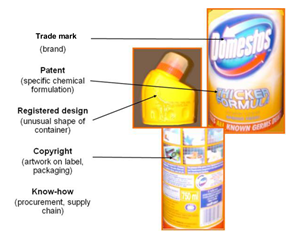Mozart is arguably the most creative musical genius of all time – but he died penniless. At the time, creations of the mind were not considered as property and were not protected. Mozart would have been a multi-millionaire had he been alive today. Today creations of the mind are known as intellectual property and it forms an integral part of our everyday lives as trade marks (brands), copyright, designs, patents and know-how.
These days, every single product or service is trade marked. In fact, a trade mark is the badge that tells the world why and how this product is different from other similar products. In many cases, trade marks of products and services have become so popular that the value of the trade mark exceeds the value of the buildings, factories, and other assets that are used to produce the product or render the service. It is rumoured that the COCA-COLA trade mark is worth more than all the assets of the Coca-Cola Company put together.
Trade marks come in many forms: some easily recognisable examples of trade marks are the name of a product (OMO), the name under which a service is rendered (STANDARD BANK), slogans (“gives you wings”), shapes (the shape of a Coke bottle), containers or colours, to name but a few.
Patents protect inventions, whether it be the chemical combination of a medicine, the way in which a super car’s turbocharger works or a new type of mousetrap.
Copyright protects creations of the mind, such as music, movies, photographs, computer programmes, drawings, pictures and books.
Bill Gates’ wealth is based almost exclusively on the royalties we pay for using the computer programmes his company has created. We pay royalties because these programmes are protected by copyright.
Design law protects the outward appearance of objects. An example would be the shape of a BMW bonnet.
Know-how consists of the confidential knowledge and business secrets of persons or businesses. These are often the “secrets” of their success.
In many cases, intellectual property overlaps. The illustration shows the ways in which this can occur:

Intellectual property is part of our daily lives. It is here to stay and no matter whether you are a guesthouse owner or Bill Gates, your intellectual property is a very valuable asset – and worthy of protection. In terms of South African legislation, most forms of intellectual property must be registered before they are protected.